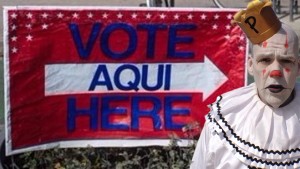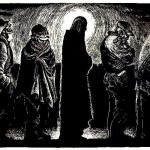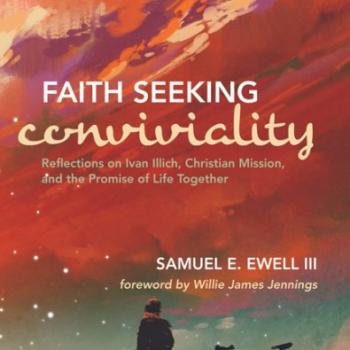[A review of Nothing to Vote For: The Futility of the American Electoral Process, by Daniel Schwindt]
One of the more misguided, even destructive projects of our hyper-merchandized culture is the labeling of entire generations into Boomers, Gen Xers, Millennials, etc. As though our society needed yet another mechanism for dividing ourselves from each other, especially via stereotypes based on shopping.
As an example of the crudity of these generational labels, I offer the example of my friend Daniel Schwindt, a younger author who cheerfully describes himself as a millennial (early 30s) and whose excellent writings reveal him as much more interesting than we might expect.
One of Schwindt’s most important topics amounts to a public refutation of several of the more benighted complaints against millennials. What’s unexpected about his arguments are first of all their breadth and depth. Taking just his recent There Must Be More Than This, Schwindt cites figures such as Charles Peguy, C.G. Jung, G.K. Chesterton, Milan Kundera, Wendell Berry, Ivan Illich, Roger Scruton, Tocqueville, Thomas Merton, Charles Bukowski, and Viktor Frankl. If millennials are supposed to exist in a purely contemporary, ahistorical mental space, Schwindt stands out with his strong literary and philosophical grounding.
Against the notion of millennials as non-religious, our author has written The Papist’s Guide to America, among other contributions to a distinctly Catholic view of things. If this generation is supposedly indifferent to questions of tradition, Schwindt’s The Case Against the Modern World: A Crash Course in Traditionalist Thought is a notable exception to this “rule.”
Labels aside, I don’t mean to suggest that my own (or anyone else’s) stage in life does not bring with it plenty of cultural baggage. I myself have whole suitcases of the stuff stored away, no doubt. Certainly my own politics has always included a certain piety-cum-frustration around the act of voting.
Schwindt has now written Nothing to Vote For: The Futility of the American Voting Process, a short e-book holding up this quadrennial rite to an almost Nietzschean intensity of reflection. He has no problem with politics in itself, “only with what passed for politics today, which was more like a poorly produced reality show.”
Thus, he tells us, he has never voted, initially because he simply believed it would do no good. But the great American system—“the exemplary democracy after which, we are told, the world ought to model itself”—produced as its presidential candidates “two characters whom I would not trust with my car keys, much less the security of a nation.”
Trump’s victory, followed by the predictable round of “better luck next time” observations, pushed Schwindt to a new conclusion: political participation, in the form of the vote, in fact represents a social evil. The speed with which Trump’s accession to the White House was normalized by the culture, he realized, is partly due to the shared notion that “voting works,” a kind of guarantee that any result will be acceptable. Thus there’s no need for any alternative. Democracy is the victor!, we cry, evincing “a degree of servility that no monarch in history could have hoped to achieve, owing to our credulity about the premise that voting equals power.
Thus Schwindt no longer sees the voting process as merely futile but now as something far more sinister: a form of civic suicide, “one that I’m not sure I can continue to silently observe while still sleeping at night.”
He goes on:
“Edmund Burke is famous for saying: ‘The only thing necessary for the triumph of evil is for good men to do nothing.’ I agree with this and simply respond that good men do nothing because they are voting instead. That, in a nutshell, is the premise of this book.”
All political activity, he argues, seems to form a huge circle that begins and ends on Election Day, and which therefore goes nowhere but around, “in a freakish equilibrium of impotence.” (Something like roasting marshmallows at the apocalypse, as one of his chapter headings puts it.)
Schwindt goes on to examine our fixed idea that because the system can never have a problem, the issue must be elsewhere—say, in our young people, who (like the president, whomever that might be at the time) function as scapegoats despite the fact that they are more like new arrivals who have simply inherited our manifold problems.
Schwindt quotes an older friend, a Vietnam veteran: “What is really necessary for a reform? For my [Boomer] generation to die. The ideals my cohort held are not the kind that sustain themselves and will likely be forgotten. Apres moi, le printemps.”
The Founders offer the author some support in their staunch support for a republic, not a democracy, one best managed by an aristocratic elite, as Jefferson and Adams clearly believed. By contrast, our messianic faith in the mechanism of voting, Schwindt points out, might be called democratism, “a mentality that results from an obsession with a principle—the principle of self-government.”
Other topics are equally provocative. “Voting as superstition”: we vote because we’re fearful of change and voting feels like control. The observation that this year’s non-voters (the 45% of eligible voters who didn’t show up at the polls) will have to live with a president chosen by a minority (Trump won 26% of the 55% who voted), a result which a higher voter turnout would likely not have changed.
Schwindt considers voting as a kind of secular dogma, the violation of which is to most Americans an act of treason. Then there’s assessing not only what your vote does to the world but what the act of voting, dear reader, does to you and your character, your dignity, given what you are giving your consent to (remember “consent of the governed”?). (Do you, in other words, exit the voting booth “degraded, frustrated, disappointed, patronized, and servile”?)
Voting as a hedge against tyranny. Voting as “your Christian duty.” (“No. It. Is. Not,” Schwindt replies.) Voting as a diversion, as Chesterton noticed:
“It is the mark of our whole modern history that the masses are kept quiet with a fight. They are kept quiet by the fight because it is a sham-fight: thus most of us know by this time that the Party System has been popular only in the sense that a football match is popular.”
Thus each election is a grand project, the author comments, and insanely expensive. “But it is worth it, because it ensures that everything continues just as it is, and that those who rule will not be disturbed.”
On economic inequality translated into politics: “The rich man’s vote, regardless of what the law says about equality, is worth more than the poor man’s. This is because the poor man just has his vote, while the rich man has a vote and the economic power to determine what is being voted about. They both fill out the ballot, but one of them wrote it.”
In addition to his own pungent insights, Schwindt draws on interesting sources such as Thomas Ferguson’s Golden Rule: The Investment Theory of Party Competition to buttress his points about the true nature of our “institutionalized bribery.”
The author includes chapters entitled “Eight Stages of Voter Apathy” (from belief in the system to “voting abstinence) and “Twelve Steps To Voter Recovery” (“Step 12: Help others. You are not alone. There are many like you. They too have been abused by their political party. They need you to show them how a sane, self-respecting citizen can continue to exist without voting.”).
WWDD, we might ask here? (What would Dorothy do?)
Long-time Catholic Worker Brian Terrell recently wrote: “Day considered the ballot and decided that it was not worth her time. Fasting and prayer, on the other hand, she found worthwhile, along with sharing resources in community, breaking bread with the hungry and welcoming the stranger, tending gardens and engaging in daring acts of nonviolent protest. These activities constitute a practical political program that she could embrace. It is a program that, unlike the paltry and soon to be betrayed promises of the corporate political parties, holds infinite potential to bring peace and healing to this tortured planet.”
The line from Day to Schwindt would not appear to be a long one.













